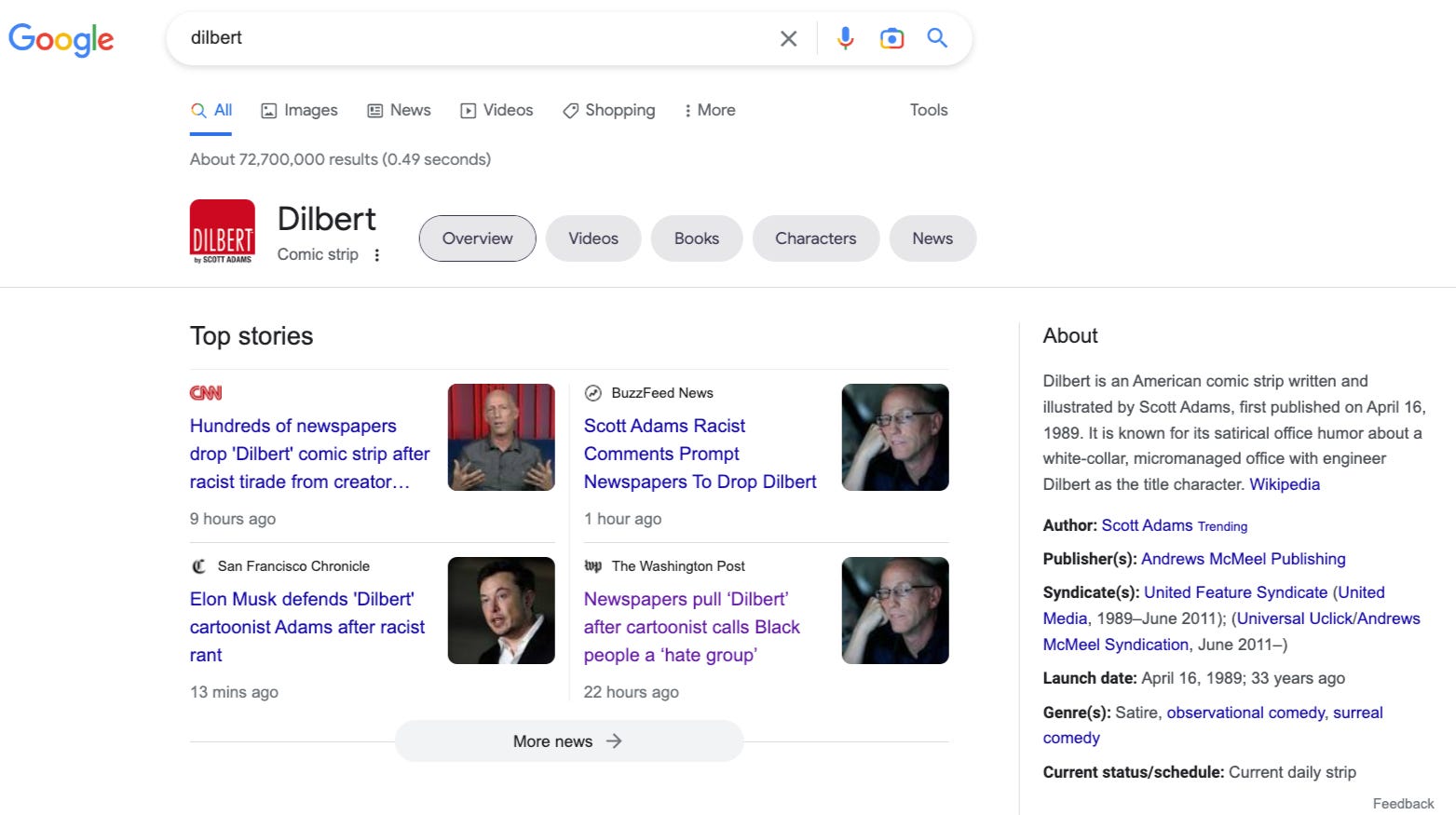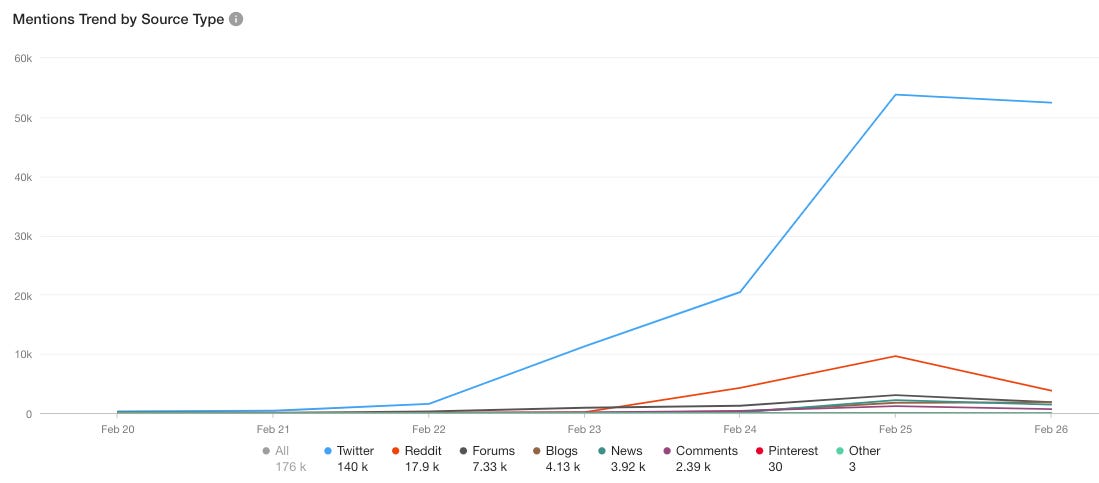Dilbert Canceled
By The Numbers: How Scott Adams destroyed his reputation (or did he?)

I gotta admit, I was never a Dilbert fan.
The strip appeared regularly alongside what I would consider the golden age of comics that were the regular lunchroom fare during my corporate days.
I’m a fan of such classics as:
Calvin and Hobbes,
The Far Side,
Bloom County, and
Doonesbury.
I even dabbled in comics myself with an artist friend; our central character was named Roy the Squid.
Despite my Dilbert disinterest, the strip clearly had an appeal. According to the Dilbert Wikipedia page, citing unitedfeatures.com:
as of 2013 [Dilbert] was published daily in 2,000 newspapers in 65 countries and 25 languages.
I have no idea how much Scott Adams, Dilbert’s creator, is worth but I’ll take a wild guess and assume that he has a pretty comfortable life.
So why do you risk such a significant source of revenue and completely predictable destruction of your reputation with belligerent, in-your-face racist opinions?
Apparently, Adams has a “show” on YouTube during which he recently claimed that Black Americans are a “hate group” and advised that White people should “get the hell away from” them.
Andrews McMeel Universal, Adams’ syndication company, abandoned him like a VHS cassette.
Adams used the suspect Rasmussen poll, which used a white nationalist trope to elicit the results they were hoping to get, as his launch point for his racist rant.
Time’s Janell Ross points out:
First there’s Rasmussen’s work, which Adams says undergirded his claims. Adams’ arguments were based on his read of a Rasmussen Reports survey showing that of the 1,000 polled, 117 of which were Black, almost 50% of Black respondents disagreed with or were not sure if they agreed with the statement “It’s OK to be white.”
So, the sample size from which Adam’s premises his rant, is around 61 people. But I don’t need to convince you that Adams is a racist; he’s doing a good enough job on his own.
Scott Adams’ Reputation By The Numbers
Let’s take a look at the digital signals Adams’ racist remarks are creating. First, the news coverage of the controversy. A Google News search for “dilbert” shows the breadth of the media coverage:
Count the number of times the word “racist” appears in the headlines of those stories along with the word “dilbert.” If I did a search for “Scott Adams” I would’ve seen the same basic results, except with “Scott Adams” in place of Dilbert alongside the word “racist.”
Those are measurable metrics.
The frequency with which the words “dilbert” and “scott adams” appear in close proximity to the word “racist” is an indication of how relevant the word “racist” is to the subject.
The fact that the words appear in the headline of the stories rather than in the body copy is an indication of the prominence of the topic, in this case the fact that Scott Adams is a racist.
Finally, the volume of news coverage from a wide variety of media outlets, almost all of which include some variation of the words “dilbert” and/or “scott adams” and “racist” in their headlines is a powerful signal for algorithms to interpret.
Coverage of Adams’ racism isn’t restricted to the internet, of course. It’s being reported via traditional broadcast channels, cable television and print media, as well.
People react to the media they consume. If they want to learn more about something they read in the newspaper or heard on the radio or saw on TV, they will likely turn to search engines.
This chart from Google Trends illustrates the spike in searches for “Dilbert” and for “Scott Adams” as a result of the media coverage:
The top related trending searches as a result of this media coverage include the words “racist,” “rant,” and “black,” among other related words.
Top Scott Adams Searches - 02/19/2023 - 02/26/2023
dilbert scott adams
dilbert
cartoonist scott adams
dilbert cartoonist
dilbert cartoonist scott adams
scott adams net worth
scott adams dilbert comic
scott adams racist
scott adams twitter
scott adams news
scott adams rant
scott adams youtube
scott adams black
what did scott adams
scott adams dilbert net worth
scott adams racist rant
what did scott adams say
scott adams comments
scott adams wife
scott adams video
scott adams reddit
dilbert racist
kristina basham
Rising Scott Adams Searches - 02/19/2023 - 02/26/2023
dilbert cartoonist scott adams
scott adams dilbert net worth
what did scott adams say
dilbert racist
scott adams poll
scott adams black people
dilbert rant
dilbert cartoon
where does scott adams live
scott adams hotep jesus
scott adams remarks
scott adams racism
dilbert canceled
scott adams tirade
dilbert cartoonist
kevin mccarthy
dilbert racist rant
Top Dilbert Searches - 02/19/2023 - 02/26/2023
scott adams
scott adams dilbert
dilbert comic
dilbert cartoonist
dilbert cartoonist scott adams
dilbert comic strip
cartoon dilbert
dilbert canceled
racist dilbert
scott adams dilbert comic
dilbert rant
dilbert creator
news dilbert
dilbert controversy
dilbert today
dilbert dropped
dilbert comics
dilbert racist cartoon
scott adams dilbert net worth
scott adams net worth
dilbert youtube
dilbert twitter
dilbert racist rant
Rising Dilbert Searches - 02/19/2023 - 02/26/2023
dilbert cartoonist
dilbert cartoonist scott adams
racist dilbert
dilbert rant
dilbert dropped
dilbert racist cartoon
scott adams net worth
dilbert racist rant
dilbert racist comic
scott adams racist
scott adams rant
scott adams youtube
dilbert black character
dilbert creator racist
dilbert racism
The spike in search queries using the following words in conjunction with “dilbert” and “scott adams” is an indication of interest in and demand for content about those topics:
racist
rant
black
canceled
tirade
controversy
dropped
Section 2 of Chapter 1 will be published next Wednesday, in which we examine the structure of domain names and how those components can affect your online reputation. If you missed the first section of Chapter 1, you can read it here.
That search activity is a reputational signal that search engines act upon. The result, then, when people search using those keywords in the wake of such a controversy is that the topic dominates the search results:
And:
Finally, when people click on and read an article from search results, if it’s provocative enough, a certain percentage of them will share those links with commentary on social media, most likely Twitter.
This chart shows the spike in mentions on social media for “dilbert” or “scott adams” in the wake of the media coverage.
And this chart shows Twitter-specific metrics for mentions of “dilbert” or “scott adams.”
85,000 Twitter users posted about the Scott Adams story, reaching 330 million Twitter users and generating 1.8 billion impressions. Those are powerful numbers that will trip social media algorithms to give those topics more visibility in social feeds.
Finally, the nature of the conversation is captured via the words used in social posts. While social media sentiment is notoriously imprecise, you can nevertheless get a good handle on the language people are using when commenting on news stories. More signal data to feed algorithms.
Assuming Scott Adams never has a full-on mea culpa and unambiguous retraction of his history of racist remarks (highly unlikely), the algorithms will have had their say on Adams’ reputation. Now, when you seek information about him, his history of racism will always accompany that information.
So we return to the why of it: Why utter such belligerently racist opinions that pave a clear path to the cancellation of his Dilbert deals and their attendant revenue streams?
To me, this feels deliberate.
Look, how relevant is a comic strip about life as a corporate drone when corporate America now works from home?
The guy is clearly comfortable in his MAGA hat, conspiracy-baiting racist skin, so why not make a clean break from the civilized world by announcing loudly your racist bona fides during Black History Month?
Create a controversy large enough to attract the attention of white nationalists and fascists who may never have given you a second thought but now embrace you as their hero.
It is telling that the one person to come to Adams’ defense is the lunatic leader of the Twitter cesspool, Elon Musk.
One of the best ways to defang these types is to laugh at them, so I leave you with some of the best editorial cartoons about Adams:
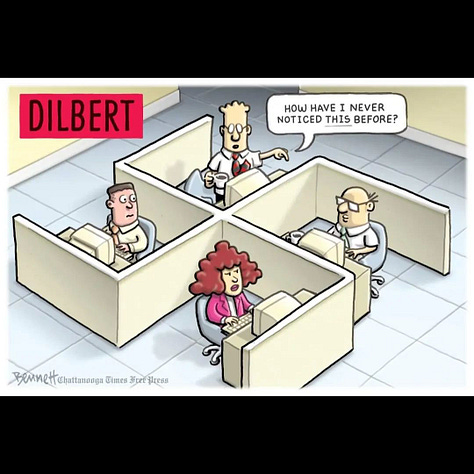

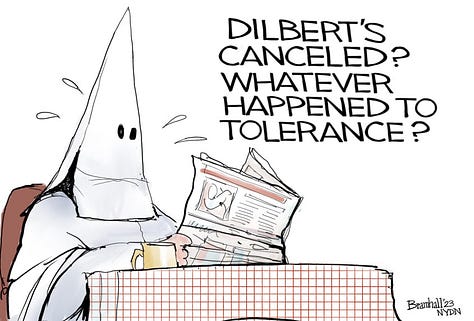
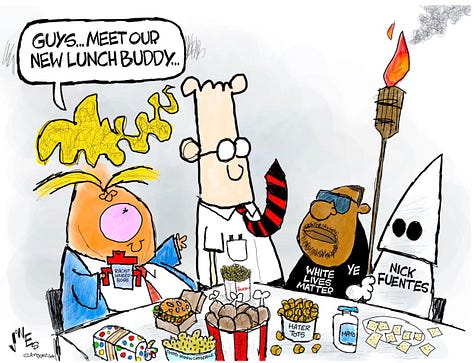
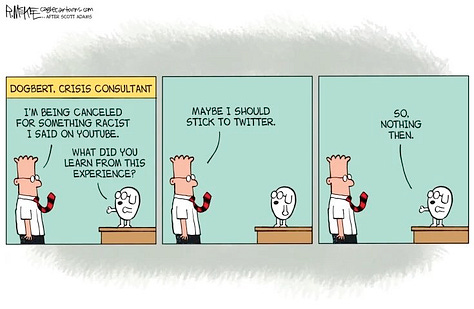

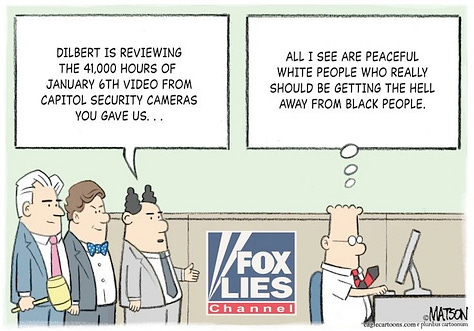
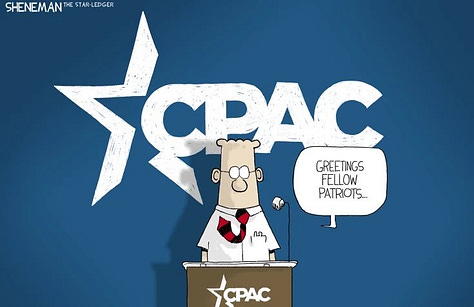
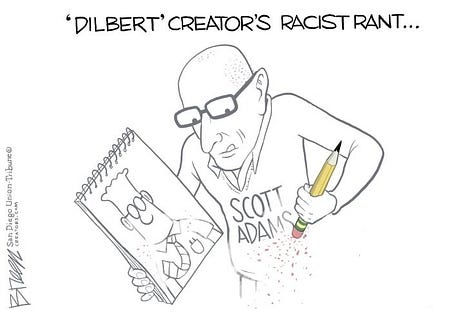
And a palate cleanser:
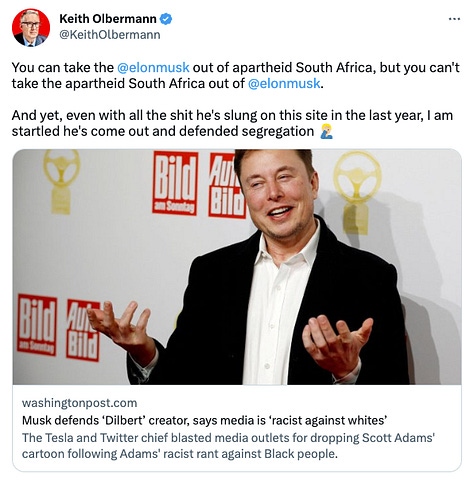


What I’m Reading
Lifehacker - Google’s Magic Eraser is one of the company’s most impressive (and one of its most advertised) features. Who wouldn’t like the ability to instantly erase unwanted people or objects from any photo? And while the feature was a Pixel exclusive from the beginning, Google is now opening the gates to virtually everyone’s smartphone, so long as you’re okay paying for it. As an iPhone users, I’ve been waiting for this day. For sssssoooooo loooonnnng!
Garbage Day - My Occam's razor assumption is that the [Twitter] For You algorithm was cobbled together from existing parts. I fundamentally do not believe Elon Musk is capable of building anything himself and so I tried to find older metrics on the platform that could be measured to determine visibility. The For You page will say if it’s showing you a tweet because it was liked by someone you follow or posted by someone that’s followed by someone you follow. But there were a whole bunch of other tweets in my feed all of a sudden I couldn’t explain, like that woman that rotates sandwiches. My first clue as to how this was working was Derek Guy, the menswear guy. In early January, I noticed that Guy was all over my timeline. And others quickly did too. My timeline was also full of gimmick accounts, but, specifically, ones focused on very basic topics. So my working theory became that the For You algorithm initially launched using accounts tagged for Twitter Topics, the sorting tool the platform created in 2019. This post is kind of a recipe for gaming Twitter's algorithm, now that Musk has fired everyone and made gaming a lot easier. Another reason why the platform is a mess (as if you needed another reason).
Mike’s List - Meta is testing paid verification ($11.99 for the web or $14.99 for mobile monthly) for both Instagram and Facebook. Twitter Blue costs $8 per month for web access; $11 per month for mobile or $84 per year. All three social networks — Twitter, Instagram and Facebook — are offering improved “reach” in the algorithm and in recommendations, better account security, tech support and other exclusive benefits. In Twitter’s paid fake-verification scheme, payers also get longer tweets and the ability to edit. In short, these social networks are offering amplification, pre-eminence and dominance for money. Musk’s message is clear: Pay and you matter. Don’t pay and you don’t matter. This trend will continue to drive the atomization of social media away from obvious pay-to-play models to channels hosting genuine community interaction and to those hosting authetic content and conversations like Substack.
CMSWire - Mastodon has a learning curve compared to other social media. To sign up, you have to pick a server. Learn what servers are and how you can pick the best one. A nice step-by-step guide to navigating Mastodon.
StarTribune - Minnesota on Wednesday launched one of the first U.S. state databases to help people think about the unthinkable — the causes of homicides, suicides and other violent deaths. The dashboard breaks new ground by pairing available demographic data on homicides, suicides and other violent deaths with details from law enforcement and coroner reports. The result is a composite look at when and where deaths commonly occur, and what types of events and problems precede them. This is really important. We need to think of violent deaths from a public health and epidemiological perspective. Here’s the dashboard
Gizmodo - These dystopian duds work by introducing new patterns specially designed to distract or confuse the [facial] image recognition software, leaving you to go about your business undetectable. Some of them look pretty cool too. Reminds me of A Scanner Darkly.
Foreign Affairs - A polycrisis isn’t just a glut of simultaneous emergencies; it is a series of crises that compound and augment one another in ways that make them harder to solve. As Tooze has put it: “the shocks are disparate, but they interact so that the whole is even more overwhelming than the sum of the parts.” A polycrisis, then, is a Gordian knot of global crises. In thinking through the causes of and appropriate responses to the current polycrisis, debates about democracy versus autocracy, north versus south, and left versus right are not very helpful. Each crisis is complex, and its interaction with other crises is even more so. There is, though, one common denominator: imbalances of power that lead to abuses of power. Impunity, in other words, is the rising global danger. The notion that “rules are for suckers” is on the march, and everyone is paying the price. A good follow-on read to my ruminations about corruption and the importance of professional ethics.
Field of View - The first time I saw this photo, I was suspicious. The ominous black mass hovering in the sky had to be from a catastrophe other than the train derailment in East Palestine, Ohio. I was wrong. I’ve been following the news coverage of this disaster and watched the horrific videos but until I saw these photos I didn’t truly, fully appreciate the magnitude of this crisis.
PetaPixel - Within Health, a digital service for people suffering with eating disorders, used an AI-powered tool known as a FAL Detector on magazine photos of Jennifer Aniston and Angelina Jolie among others. In a blog post published last month, Within Health shows how celebrity faces are routinely warped in commercial photos and the increasingly unrealistic representations of beauty in the media. Developed by Adobe Research and UC Berkley, the AI-powered tool known as a FAL Detector was trained on images that have been warped using Adobe’s “Face-Aware Liquify” feature on Photoshop. We are the media we consume and if we consume maniuplated media, our conceptions of the world at large are manipulated as well.
TechCrunch - As social media trends toward the casual and chaotic, VSCO warriors everywhere are still meticulously white balancing and A/B testing images, matching tone and vibes alike before a single photo gets minted onto their Instagram feed. And while VSCO’s photo editing DNA runs deep, the app has learned a lot about its community over the years, including that users are increasingly looking for connections rather than just hunkering down in their respective editing silos (though they’re definitely still doing that too). I am starting to think that, in the wake of Twitter’s death spiral and the disaffection for the Facebook/Instagram industrial complex, that the trend of social media is toward atomization. Discreet social media communities. That’s precisely what the fediverse is all about. And that’s what’s driving the adoption of Slack channels and Discord. This presents tremendous challenges for the likes of us digital marketers, of course, but it also presents plenty of opportunities. Thought leadership needs to include deep involvement in these under-the-radar communities. The trick will be educating clients on the increased costs associated with this legwork.
Chicago Tribune - The shift from Keep America Beautiful’s bland admonishments about litter to the Crying Indian did not represent an embrace of ecological values but instead indicated industry’s fear of them. In the time leading up to the first Earth Day in 1970, environmental demonstrations across the United States focused on the issue of throwaway containers. All these protests held industry — not consumers — responsible for the proliferation of disposable items that depleted natural resources and created a solid waste crisis. Enter the Crying Indian, a new public relations effort that incorporated ecological values but deflected attention from beverage and packaging industry practices. You may have seen that the rights to the “Crying Indian” ad were recently handed over to a Native American group to close the chapter on this particular piece of cultural appropriation.
Axios - The four-year undergraduate liberal-arts degree is one of the last great bastions of inefficiency — even of dilettantism — left in America. For better or for worse, it is beginning to die, withering under the heel of the inescapable imperatives of capitalism…The genteel ivory tower is unlikely to live much longer. Familiar capitalistic forces are shuttering some schools and reconfiguring many more, as students increasingly question the value of spending 4 years studying Philosophy and Art History. AND The New Yorker - Kovach will graduate with some thirty thousand dollars in debt, a burden that influenced his choice of a degree. For decades now, the cost of education has increased over all ahead of inflation. One theory has been that this pressure, plus the growing precariousness of the middle class, has played a role in driving students like him toward hard-skill majors. (English majors, on average, carry less debt than students in other fields, but they take longer to pay it down.) ARRRRRRRRRRRG! As a proud English major with what amounted to a minor in Art, this gets my blood boiling. While I concede that my B.A. in English did shit for me straight out of college, I’m convinced my liberal arts education has given me a huge edge professionally, starting mid-career after I’d learned some of the technical aspects of digital marketing.
The Daily Beast - Fox News’s top media anchor wants to cover the bombshell messages released in the ongoing lawsuit between the network and Dominion Voting Systems over the 2o20 election—but the network won’t let him. “Some of you have been asking why I'm not covering the Dominion Voting Machines lawsuit against Fox involving the unproven claims of election fraud in 2020, and it's absolutely a fair question,” he said on Sunday’s MediaBuzz. “I believe I should be covering it. It’s a major media story, given my role here at Fox. But the company has decided that as part of the organization being sued, I can’t talk about it or write about it, at least for now. I strongly disagree with that decision, but as an employee, I have to abide by it.” It’s high time we stop referring to Fox as a media outlet and more properly define them as a propaganda organ of the Republican Party. Another thing we need to think about is the wisdom of letting foreign ownership of media run rampant when it is clearly at odds with our national security interests. <COUGH COUGH>Rupert Murdoch, Elon Musk</COUGH COUGH>
What I’m Watching
The most recent episode of This Week in Google started off with a fantastic discussion of Gonzalez v. Google and the legal implications for Section 230 of the Communications Decency Act, which generally provides immunity for online computer services with respect to third-party content generated by its users.
Season two of Amazon Prime's Carnival Row just started. I really enjoyed season one and so far, season two is just as strong. Set in what resembles Victorian-era London, it is a fantasy featuring humans, fairies, faun and other mythological creatures. Starring Orlando Bloom, the series is a social commentary on modern society, addressing disparities in power, wealth, class, race, gender, justice, health care, and contrasts opposing political ideologies. It is both smart and entertaining.
What I’m Listening To
NPR - Pink Floyd's album Dark Side of the Moon was released 50 years ago and it's still on the Billboard charts, making it the longest-charting album in history. Dark Side of the Moon can be enjoyed for its far-out sonic landscapes or its inventive production, which reveals new surprises with every listen. You can also study its lyrics – much of Roger Waters' writing was inspired by a former member of Pink Floyd, Syd Barrett, who was forced to leave the band he'd helped found after his behavior became too erratic, influenced in part by drug use and in part by fame. Some say it was a psychotic break. “When the band you’re in starts playing different tunes/I’ll see you on the dark side of the moon.” One of the most brilliant, perfect albums ever made.






